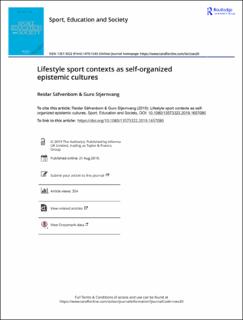| dc.contributor.author | Säfvenbom, Reidar | |
| dc.contributor.author | Stjernvang, Guro | |
| dc.date.accessioned | 2020-05-15T08:56:32Z | |
| dc.date.available | 2020-05-15T08:56:32Z | |
| dc.date.created | 2019-10-14T20:27:08Z | |
| dc.date.issued | 2019 | |
| dc.identifier.citation | Sport, Education and Society. 2019, under utgivelse. | en_US |
| dc.identifier.issn | 1357-3322 | |
| dc.identifier.uri | https://hdl.handle.net/11250/2654594 | |
| dc.description | This is an Open Access article distributed under the terms of the Creative Commons Attribution-NonCommercial-NoDerivatives License (http://creativecommons.org/licenses/by-nc-nd/4.0/), which permits non-commercial re-use, distribution, and reproduction in any medium, provided the original work is properly cited, and is not altered, transformed, or built upon in any way. | en_US |
| dc.description.abstract | Compared to traditional athletes and PE students, self-organized lifestyle sport practitioners usually have no podiums to reach or grades to earn. They have no authorized instructor available, but seem to treat this apparent deficiency as an opportunity to facilitate their own learning processes. However, from a traditional learning perspective, it can be challenging to understand how these processes unfold. Drawing on theoretical concepts from the educational sociologist Knorr Cetina, the aim of this study is therefore to understand how a self-organized mixed group of trickers, B-boys, and free-runners facilitate knowledge creation when no instructors guide or control their work. Based on observations and interviews we found that the practitioners’ knowledge developed in a continuous and invigorating circuit between a worldwide gym on the internet where the practitioners searched for updated knowledge, and the local gym where they practiced knowledge development as intra- and inter-disciplinary embodied interactions. The knowledge object conveyed by the practitioners as ‘kinesthetic understanding’ was not a fixed a-priori product that could be completely achieved, and the practitioners’ acceptance of the knowledge object’s essential incompleteness seemed to create a never-ending desire to glimpse the unattainable. The group of tumblers studied in this paper represent an alternative epistemic practice that should be explored in physical education contexts. However, such exploration requires the development of an affective and processual language that reflects the relational intimacy between students and their knowledge objects, rather than a constative language reflecting distance, achievement, and external assessment. | en_US |
| dc.language.iso | eng | en_US |
| dc.subject | learning | en_US |
| dc.subject | development | en_US |
| dc.subject | youth sport | en_US |
| dc.subject | physical education | en_US |
| dc.subject | lifestyle sports | en_US |
| dc.subject | epistemic cultures | en_US |
| dc.title | Lifestyle sport contexts as self-organized epistemic cultures | en_US |
| dc.type | Peer reviewed | en_US |
| dc.type | Journal article | en_US |
| dc.description.version | publishedVersion | en_US |
| dc.rights.holder | © 2019 The Author(s). | en_US |
| dc.source.journal | Sport, Education and Society | en_US |
| dc.identifier.doi | 10.1080/13573322.2019.1657080 | |
| dc.identifier.cristin | 1736986 | |
| dc.description.localcode | Seksjon for kroppsøving og pedagogikk / Department of Physical Education | en_US |
| cristin.ispublished | true | |
| cristin.fulltext | original | |
| cristin.qualitycode | 2 | |
